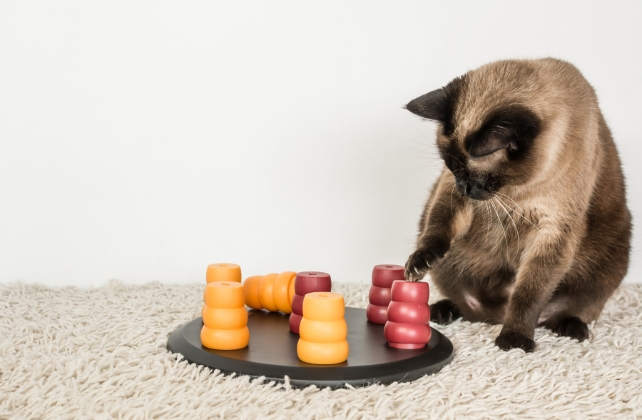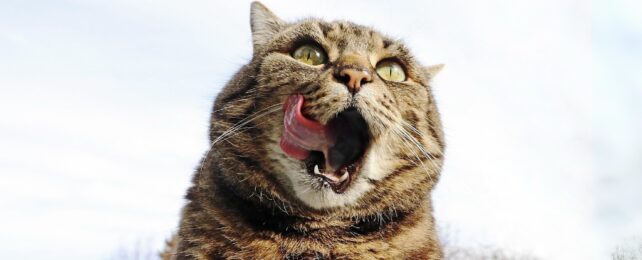Cat owners who overfeed their pets risk unwittingly causing harm to their furry pals. Overeating causes weight gain, but a new study found it can also reduce the cat's nutrient digestion and cause changes in their gut microbiota.
The finding supports advice that pet owners should restrict feeding and encourage their feline companions to undertake activity, according to the researchers.
More than half of US cats are overweight, which is a concerning figure in itself. Weight loss in cats has been extensively studied, the team from the University of Illinois Urbana-Champaign say, so they wanted to better understand the impact of weight gain.
"There has been little focus on the opposite process, which is also important," says nutritional scientist Kelly Swanson, senior author of the study.
"We wanted to learn more about the metabolic and gastrointestinal changes that occur as a result of overeating and weight gain in cats."
Their research involved 11 'lean' cats, all spayed adult females. The cats were fed a commercially available, balanced and measured nutritional diet for two weeks while Swanson and his colleagues took baseline measurements. Then, for 18 weeks, the animals were given the same kind of food but were allowed to eat as much and as often as they wanted.
At baseline, as well as 6, 12, and 18 weeks after the all-you-can-eat buffet commenced, the researchers collected fecal and blood samples as well as unguided physical activity data via monitors attached to the cats' collars.
"We expected that weight gain might lead to decreased physical activity, but we did not observe any consistent changes in activity level," Swanson says. "However, this could vary with individual cats and their environment, and how much their owners interact with them."
The cats wasted no time increasing the amount of food they ate once permitted, and unsurprisingly gained weight. As cats ate more and grew in mass, their body fat levels increased and their ability to digest nutrients decreased.
"When the body gets less food, it will be more efficient in extracting nutrients. But when the amount of food increases, it passes through the digestive system faster and fewer nutrients are extracted in the process," says Swanson.

With more food, cats pooped more and produced stool that was more acidic – a sign that food is not being digested effectively.
"In humans, a low fecal pH indicates poor absorption of carbohydrates and fat. Our findings correlate with this, as reduced fecal pH aligned with higher food intake and reduced digestibility," Swanson explains.
The researchers discovered differences in the types of microbes living in the guts of the cats before and after 18 weeks of free feeding. Additionally, gastrointestinal transit time (essentially the time from eating food to pooping out the waste products) decreased by about 25 percent as the cats packed on the pounds.
"The change in the gastrointestinal transit time was a novel finding and a potential reason for the change in fecal microbiota," Swanson says.
Notably, some changes in the microbiome of the cats that were studied were contradictory to those seen in people with obesity, indicating there are probably more complex factors at play here than just weight.
Understanding the metabolic and gastrointestinal changes that occur with cat obesity may help prevent and treat it, and the team says further research could look more closely into how the gut microbiome changes relate to overall health.
Along with other researchers, Swanson and his colleagues showed in another new paper that limiting cats' food intake can help them lose weight and fat safely.
And when the weight gain study was over, the 11 cats were put on restricted diets that fortunately allowed them to lose weight and return to baseline levels.
Along with feeding cats just what they need, the authors suggest pet owners do things to encourage physical and mental activity at mealtime. They can separate food into small amounts placed in different locations, throw food for cats to retrieve, and use food puzzles.
Cats are clever and they don't seem to like being told what to do, but it looks like our often fiercely independent companions can live healthier and happier lives with the right interventions from us.
The research has been published in the Journal of Animal Science.
